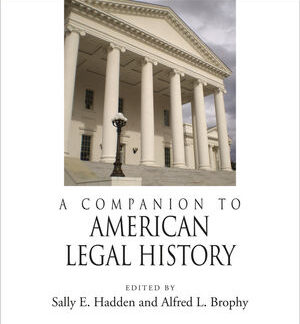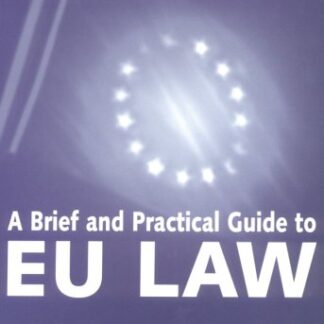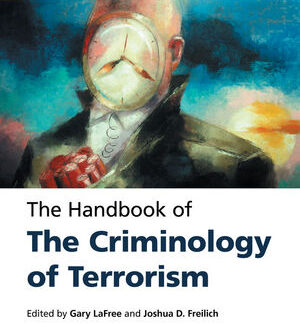Description
The Blackwell Companion to Criminology, ISBN-13: 978-0631220923
[PDF eBook eTextbook]
Wiley Blackwell Companions to Sociology (Book 16)
544 pages
Publisher: Wiley-Blackwell; 1 edition (September 26, 2003)
Language: English
ISBN-10: 9780631220923
ISBN-13: 978-0631220923
The Blackwell Companion to Criminology provides a contemporary and global resource to scholarship in both classical and topical areas of criminology. Written accessibly, and with its international perspective and first-rate scholarship, this is truly the first global handbook of criminology.
– Editors and contributors are international experts in criminology, offering a comparative perspective on theories and systems
– Contains full discussion of key debates and theories, the implications of new topics, studies and ideas, and contemporary developments
– Coverage includes: class, gender, and race, criminal justice, juvenile delinquency, punishment, mass media, international crimes, and social control
Review
“A cosmopolitan collection characterized by freshness of perspective. Critical sociological insight on crime at its best.”
John Braithwaite, Australian National University
“If The Blackwell Companion to Criminology is read widely and carefully, and absorbed thoroughly – as it most certainly should be – it will shake criminology out of its intellectual sloth and parochialism.”
Gilbert Geis, University of California
“The Blackwell Companion to Criminology is a comprehensive reference work designed for those interested in the study of crime, and its causes, effects, trends, and institutions… Taken together, this edited book is a welcome contribution, and essential reading for those studying elements of criminology and criminal justice.”
The Howard Journal of Criminal Justice
“Many of these essays are brimming with powerful reasoning and vitally informative details … Strengths lie in the analyses of such topics as modern genocide, juvenile crime, female offenders, elite offenders, international outlaw networks, globalization effects on crime trends, and information technologies. Also beneficial are the tightly reasoned critiques of how crime is communicated to the public and targeted by state agencies. As they explore cutting-edge questions in criminology, readers will find sophisticated theoretical scholarship, especially regarding modern and postmodern frameworks, feminism, critical cultural studies, and neo-Marxism … Summing Up: Essential.”
Choice
Table of contents
Preface.
List of Contributors.
Part I: Crime, Justice, and Societies:.
1. The Social Nature of Crime and Deviance: Colin Sumner.
2. Theories of Social Control and the State between American and European Shores: Dario Melossi (University of Bologna).
3. Criminal Justice Process and the War on Crime: Markus Dirk Dubber (State University of New York).
4. Criminology, Genocide, and Modernity: Remarks on the Companion that Criminology Ignored: Wayne Morrison (University of London).
Part II: Juvenile Delinquency and Justice for Youth:.
5. The Criminologists’ Gang: Jack Katz and Curtis Jackson-Jacobs (both University of California, Los Angeles).
6. Youth Crime and Crime Control in Contemporary Japan:Mark Fenwick (Kyushu University, Japan).
7. Consumer Culture and Crime inLate Modernity: Keith J. Hayward (University of Kent).
8. The Politics of Youth Crime and Justice in South Africa: Elrena van der Spuy (University of Cape Town), Wilfried Schärf (University of Cape Town), and Jeffrey Lever (University of Stellensbosch, Cape Town).
Part III: Punishment and Its Alternatives:.
9. Penal Policies and Contemporary Politics: Pat O’Malley (University of Sydney).
10. Beyond Bricks, Bars, and Barbed Wire: The Genesis and Proliferation of Alternatives to Incarceration in the United States: Barry R. Holman and Robert A. Brown (Indiana University Purdue University Indianapolis).
11. Rehabilitation: An Assessment of Theory and Research: Mark W. Lipsey (Vanderbilt Institute for Public Policy), Nana A. Landenberger (Vanderbilt Institute for Public Policy), and Gabrielle L. Chapman (Tennessee Department of Corrections).
12. Female Punishment: From Patriarchy to Backlash? Laureen Snider (Queen’s University, Kingston, Ontario).
Part IV: Gender and the Masculinity of Crime:.
13. Beyond Bad Girls: Feminist Perspectives on Female Offending: Meda Chesney-Lind (University of Hawaii).
14. Managing “Men’s Violence” in the Criminological Arena: Adrian Howe (University of Central Lanacshire).
15. Masculinities and Crime: Rethinking the “Man Question”? Richard Collier (University of Newcastle upon Tyne).
16. “Abominable and Detestable”: Understanding Homophobia and the Criminalization of Sodomy: Mary Bernstein (University of Connecticut).
17. The Gendering and Racializing of Criminalized Others: Elizabeth Comack (University of Manitoba).
Part IV: Capital, Power, and Crime:.
18. White-Collar Crime: Amedeo Cottino (University of Turin).
19. “Dance Your Anger and Your Joys”: Multinational Corporations, Power, “Crime”: Frank Pearce (Queen’s University, Kingston, Ontario) and Steve Tombs (Liverpool John Moores University).
20. Globalization and the Illicit Drugs Trade in Hong Kong: K. Joe Laidler (University of Hong Kong).
21. Trafficking in Human Beings and Related Crimes in West and Central Africa: Alexis A. Aronowitz (University College of Utrecht) and Monika Peruffo (International Organization for Migrations Mission in Columbia).
Part V: Globalization, Crime, and Information:.
22. Globality, Globalization, and Private Policing: A Caribbean Case Study: Maureen Cain (University of Birmingham).
23. The Rise of the Surveillant State in Times of Globalization: Thomas Mathiesen (University of Oslo).
24. The Politics of Crime Statistics: William J. Chambliss (George Washington University).
25. Two Realities of Police Communication: Aaron Doyle (Carleton University, Ottawa) and Richard Ericson (University of Toronto).
26. Hacktivism: Resistance is Fertile? Paul A. Taylor (University of Leeds).
Index
What makes us different?
• Instant Download
• Always Competitive Pricing
• 100% Privacy
• FREE Sample Available
• 24-7 LIVE Customer Support




